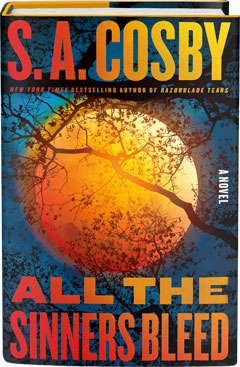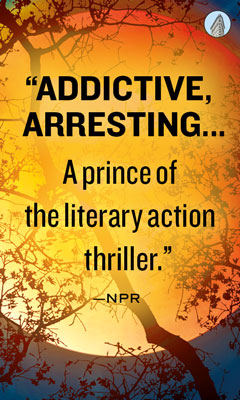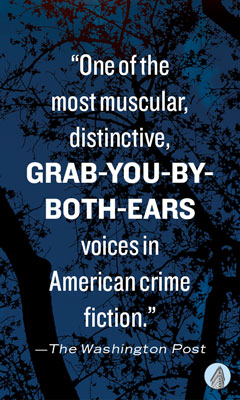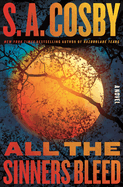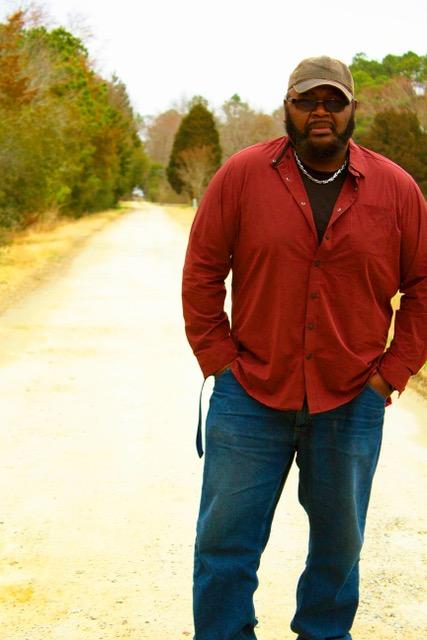All the Sinners Bleed
by S.A. Cosby
From S.A. Cosby, author of Blacktop Wasteland and Razorblade Tears, All the Sinners Bleed is a lushly dark mystery set in fictional Charon County in Southeastern Virginia and starring a Black sheriff in a town that's not at all sure it's ready for one. Recently elected Sheriff Titus Crown is out to right some wrongs from the inside: police corruption, racism and profiling, law enforcers living above the law. He's also dodging a few traumas of his own. Having come home to Charon County means he gets to live with and help his aging father, but it also means he's reminded of his beloved late mother. His brother lives in town but rarely comes around. Titus has a local girlfriend who's very sweet and good for him, but sort of unremarkable; he has a sense he should love her more. He's haunted by the events that ended his FBI career in Indiana. Running a small staff of deputies in a small Southern town has its own challenges, mostly manageable ones; he hopes to redeem himself in this way from wrongs only hinted at.
But then there's a call about an active gunman at the high school in town. In minutes, Titus is looking at a popular teacher of decades shot to death in his classroom, and a young Black man killed by deputies while the school--and via their cell phone videos, the entire Internet--watched. Before Latrell Macdonald died, "with a wolf's snout in his left hand and cradling a .30-30 like a newborn in the crook of his right arm," he spoke of crimes that make Titus's blood run cold. The ensuing investigation will crack Charon County wide open, and challenge to the core Titus's plans to clean up his hometown and make amends for things that happened in Indiana.
Titus is no investigative slouch. "His instructors at the Academy had their own version of String Theory. The way they explained it, there were invisible strings that vibrated unseen in the liminal spaces between sunrise and secrets, between rumor, shadows, and lies. Strings that pulled all this together. All you had to do was find the seam and unravel it. Or rip it apart." His years with the Bureau and training under his friend and mentor there give him an edge on profiling and pursuing an enemy who seems determined to toy with him. He finds the remains of badly tortured and murdered Black boys and girls; as he investigates, the body count only rises. An old girlfriend from his FBI years appears, asking to interview him for her crime podcast; his father pleads with him to come back to church. The Sons of the Confederacy are planning a march at the upcoming Fall Fest, and a strange story surfaces about a reclusive fire-and-brimstone snake-handling preacher. Increasingly distressed at his inability to keep his county safe, Titus is plagued by memories and the present evil attacking his home. On less and less sleep, he doggedly puts in work. "He went over a few other emails, reviewed the gas expense reports, checked the arrest log from last night, updated the Sheriff department's social media page.... It felt strange to attend to the mundane and the profane at the same time but that was a defining aspect of the job."
All the Sinners Bleed is noir with a particular American Southern twist. Place figures heavily. "The soil of Charon County, like most towns and counties in the South, was sown with generations of tears.... Blood and tears. Violence and mayhem. Love and hate. These were the rocks upon which the South was built." Cosby deals in timely themes: returning home and reckoning with old wounds and crimes; the unsavory histories of the places we love; the legacies of Confederate statues, of slavery and racism; the darkness within all of us, even those playing the good guys; the role of police and policing. His prose is gruff, poetic but stark: "The clouds gathered like young men on a corner getting ready for a fight." Titus has a code like that of Michael Connelly's Detective Harry Bosch: "Either we all matter or no one matters. Everyone deserves to have someone speak for them." He believes that something hard and mean dwells in every heart--and in a few, true evil. What has beset Charon County is not supernatural. It is merely the wages of sin (as his churchgoing neighbors might say), or the county's bloody past coming back around. There is something of the lone gunslinger--damaged but virtuous--in Titus Crown, who stands against the worst elements of human nature. Like Cosby's previous novels, All the Sinners Bleed is often grim, but it lands on a surprisingly hopeful, even joyful ending.
For fans of gritty, dark mysteries with an interest in the very real and contemporary demons of United States culture and history, Cosby's work offers a sinister but satisfying voyage into the best and worst of returning home and starting fresh. --Julia Kastner



